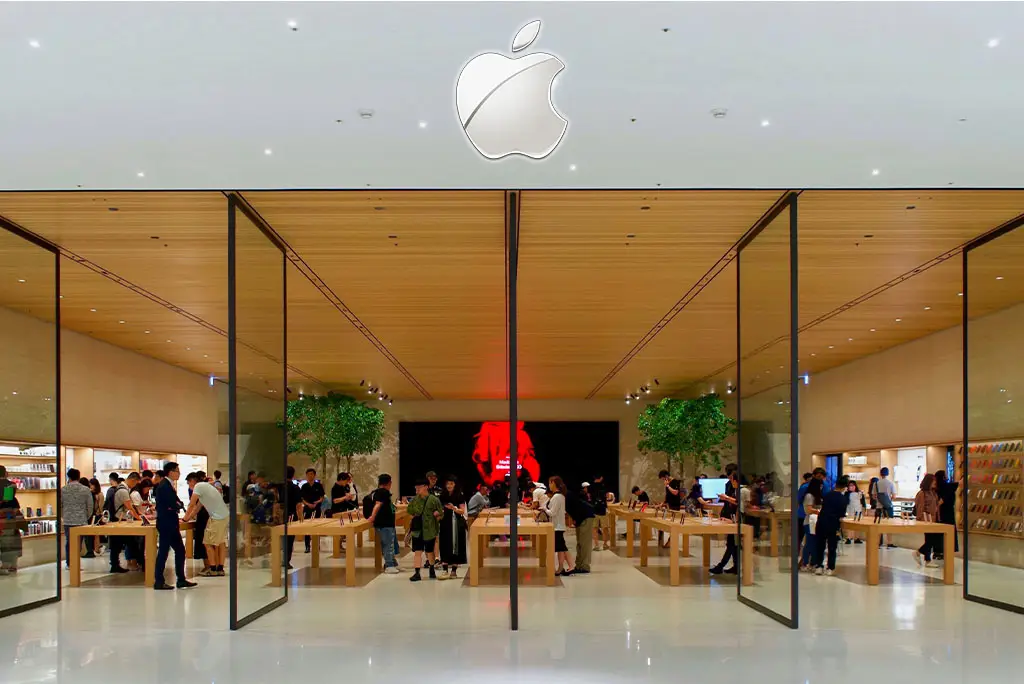Apple has expanded its retail presence in India by opening its first store in Mumbai. The store is at Jio World Drive in Mumbai’s Bandra Kurla Complex (BKC). It spans over 20,000 square feet across two levels and will employ approximately 100 people who can speak 25 languages. Moreover, Apple’s second store in India is set to open on April 20 in Delhi’s Saket. It will cover an estimated 8,400 square feet. With the opening of these stores, Apple aims to create deeper connections with its customers in India, the world’s second-largest smartphone market.
Apple’s Keen Interest in India
Apple CEO Tim Cook is in Mumbai for the store opening events. He is expected to meet with top policymakers. This also includes Prime Minister Narendra Modi. He will discuss the company’s plans to deepen its iPhone manufacturing in India and explore other production areas, such as AirPods. The company has been ramping up local manufacturing to meet growing domestic demand and for exports. Apple currently employs around 2,500 people across its corporate offices in India.
Opening physical stores in Mumbai and Delhi underlines Apple’s keenness to gain a stronger foothold in India. However, the company had to navigate several challenges to establish a presence in the country. This includes strict local sourcing rules and high import taxes on electronics. However, with the rise of domestic manufacturing and increasing demand for Apple products, the company has been exploring ways to expand its presence in India.
Inclusive and Sustainable Retail
The Mumbai store is operationally carbon neutral. It is running on 100% renewable energy. Thus, making it one of Apple’s most sustainable and inclusive stores globally. Almost half of the team members, including the leadership, in the Mumbai outlet, are women. This demonstrates Apple’s commitment to diversity and inclusivity.
Store Layout and Offerings
The store’s first level contains the display area for Apple products for accessories like phone cases, AirPods, and Apple Watch straps. The accessory display is also expanded to the second level. Additionally, it will serve as the service area where customers can pick up their online orders or resolve their product or service-related issues.
The structure of the store includes a section designated as the Apple Forum. Free daily sessions will teach consumers how to get the most out of their Apple products. The seminars will thus offer advice on using the goods and services offered by the “Today at Apple” program.
Under a special program titled ‘Mumbai Rising,’ Apple has collaborated with local artists who will share tips on using Apple products to create their art. This program highlights the company’s focus on the local community. This also highlights its efforts to create meaningful connections with its customers in India.
Apple has been trying to increase its presence in India in recent years. However, Apple’s market share in the country is relatively low. This is partly due to the high prices of its devices. The company has been ramping up local manufacturing for exports and meeting growing domestic demand to boost sales.
In 2017, Apple began manufacturing the iPhone SE in India. In 2018 it also started manufacturing the iPhone 6S. The company has expanded its local manufacturing operations and now produces several other iPhone models nationwide. Manufacturing in India allows Apple to avoid high import duties on its products, which can make them prohibitively expensive for many consumers.
In addition to manufacturing, Apple has invested in other areas in India. In 2020, the company announced that it would be opening its first online store in the country. Thus, allowing customers to purchase Apple products directly from the company. The move was seen as a major step for Apple in India, where e-commerce is rapidly growing.
Also Read This: Apple Triples Production in India, Exports $5 Billion iPhones
